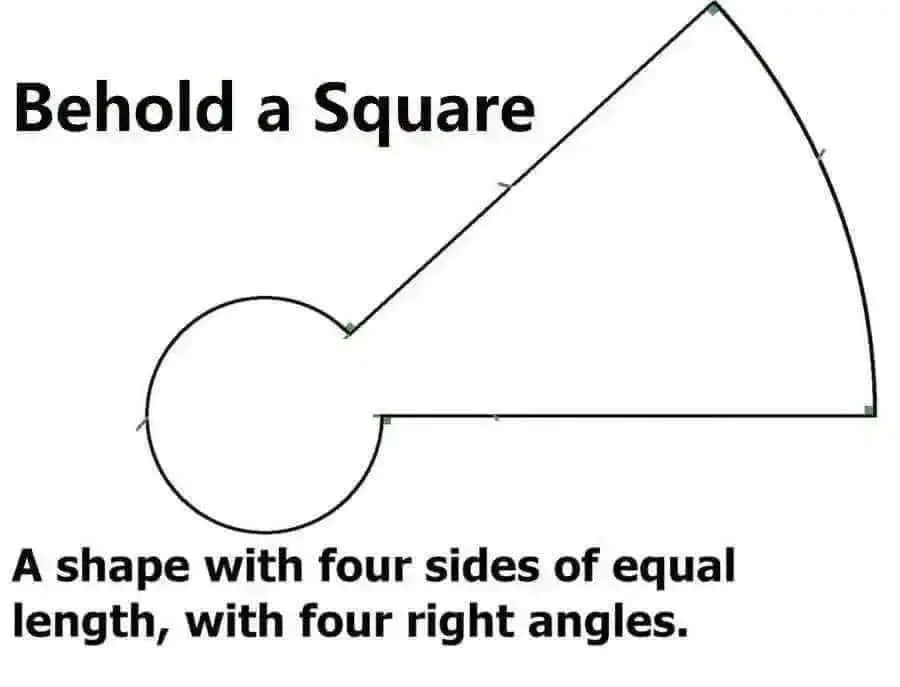As long as we ignore the parallel sides requirement, sure.
Science Memes
Welcome to c/science_memes @ Mander.xyz!
A place for majestic STEMLORD peacocking, as well as memes about the realities of working in a lab.

Rules
- Don't throw mud. Behave like an intellectual and remember the human.
- Keep it rooted (on topic).
- No spam.
- Infographics welcome, get schooled.
This is a science community. We use the Dawkins definition of meme.
Research Committee
Other Mander Communities
Science and Research
Biology and Life Sciences
- [email protected]
- [email protected]
- [email protected]
- [email protected]
- [email protected]
- [email protected]
- [email protected]
- [email protected]
- [email protected]
- [email protected]
- [email protected]
- [email protected]
- [email protected]
- [email protected]
- [email protected]
- [email protected]
- [email protected]
- [email protected]
- [email protected]
- [email protected]
- [email protected]
- [email protected]
- [email protected]
- [email protected]
- !reptiles and [email protected]
Physical Sciences
- [email protected]
- [email protected]
- [email protected]
- [email protected]
- [email protected]
- [email protected]
- [email protected]
- [email protected]
- [email protected]
Humanities and Social Sciences
Practical and Applied Sciences
- !exercise-and [email protected]
- [email protected]
- !self [email protected]
- [email protected]
- [email protected]
- [email protected]
Memes
Miscellaneous
And that the 90 degree angles should be interior angles.
And that polygons should only consist of straight lines.
Yes sure, in Euclidean geometry, but this is clearly keyhole shaped geometry.
geodesics
They're also not actually right angles, as the curvature starts departing from the angles origin. They may be approximately 90, down to many many small decimal places, but they are not 90.
That's not accurate. If you are measuring the angle of a line intersecting with a curved surface, you measure against the tangent at the point of contact/intersection. It can be and still is exactly 90 degrees.
Take shitposts seriously and point out their obvious errors
-Carl Friedrich Gauss, probably
Science memes is not r/shitposting? I would assume the person is serious when posting here.
gasp!!! it is c/!!!
I would assume the person is serious when posting here.
This sounds like a "you" problem
The name of that Gauss?
Ampere
c/gatekeeping squares
You're no fun
Polar coordinate square?
I remember enough from geometry to know this is horseshit and be annoyed at it but not enough to actually prove why
Sides must be straight and parallel two and two.
QED
What are the 4 sides?
The black lines
The semi-circle is one side, then the 2 straight edges, and the arc between them is the 4th side.
That's what I thought. The only way on which this has four sides is if the semi -circle is a side. But if that's the case, then I don't know wha the definition of "side" is
Knock knock. Do you have a moment to discuss non-euclidean geometry?
/slams door
Someone may want to double-check my math on this one, but the length of the sides will be dependant on the radius of the smaller circle

I look at your diagram and see:
ϴ= L/(L+R)
And
2π-ϴ = L/R
I solved those (using substitution, then the quadratic formula) and got
L= π-1 ± √(1+π²) ~= 5.44 or -1.16
Whether or not a negative length is meaningful in this context is an exercise left to the reader
Giving (for L=5.44):
ϴ~= 0.845 ~~48.4°
I'm surprised that it solved to a single number, maybe I made a mistake.
That lines up pretty similarly with what I found also. The angle should be a constant since there is only one angle where the relationship would be true. I just left it in terms of π because I try to avoid rounding.
Having said that, L would be a ratio of r; which I think lines up with what you found as well.
it’s homeomorphic to a square, so why not
See, you get it
I'll tell you why not! You hippie homeopaths are all the same! Science has scienced the evidence that there's no evidence for homopathic medicines otter than the libido effect.
